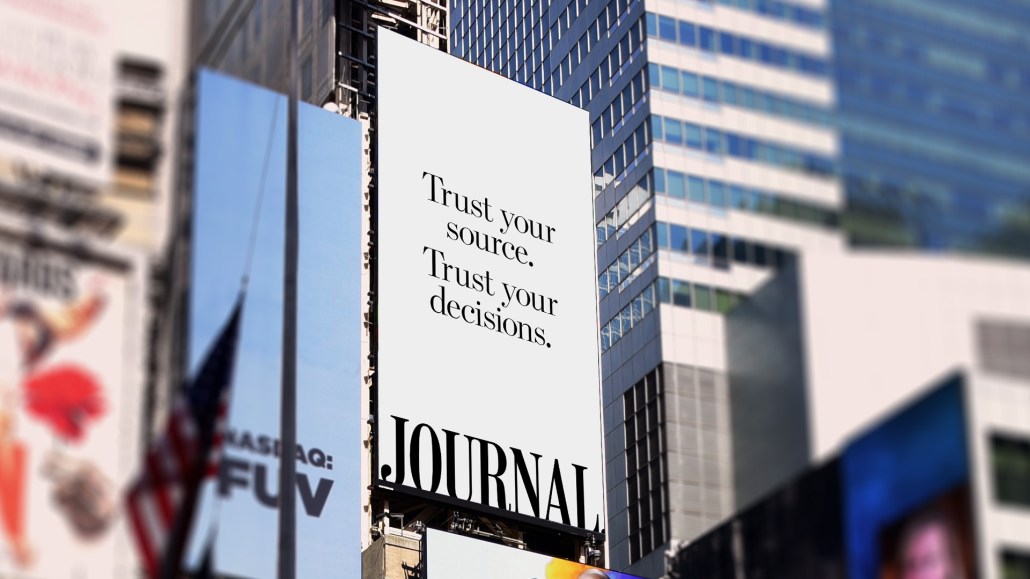Secure your place at the Digiday Publishing Summit in Vail, March 23-25

The Wall Street Journal is going on a subscriber acquisition spree in the two months before its fiscal year ends on June 30, having debuted a new brand marketing campaign this week, and next month temporarily dropping its paywall for the first time this year.
Called “Trust Your Decisions,” the campaign launched this week and focuses on the role the WSJ plays in readers’ decision-making processes in business, finance and in their personal lives. That’s a shift in messaging from the publication’s previous campaign, “Read Yourself Better,” which launched in November 2019 to tackle the issue of widespread misinformation.
As part of its brand push, the WSJ is planning to hold an “open house” on May 20 in which it will drop the paywall on its site to let all content be accessible for free for the day, said Suzi Watford, evp, consumer at the WSJ’s parent company Dow Jones.
The tactic serves as an “extremely good way to market and sample content, which is the best way to grow that [brand] consideration,” and also “should help to turn ‘colder’ audiences into future subscribers,” she said. However, readers will need to register with their email, which allows the WSJ to continue to market subscriptions to them after the open house. The WSJ last dropped its paywall on Election Day in 2020.
“We see an opportunity to attract new members, drive further consideration for the brand and demonstrate how useful the Journal can be,” said Watford.
The WSJ declined to say how many subscriptions have come from its brand campaigns in the past. Watford noted that previous campaigns have shown “strong results on brand-building metrics particularly around consideration and trust.”
The WSJ has 3.2 million subscribers. Dow Jones, which also owns brands like Barron’s and MarketWatch, has about 4 million total subscribers. The parent company set a goal in the fall of 2020 to double its paying membership, but the company declined to say when it hopes to reach that goal. According to News Corp’s Q2 2021 earnings report, Dow Jones’ circulation and subscription revenues increased $23 million, or 8%, compared to the year prior.
For its latest campaign, the WSJ is running ads in print publications, online, on social platforms and in physical locations, such as ads in New York City’s Times Square. The campaign is global, but the out-of-home ads are starting in New York City before rolling out to other markets. Creative agency The&Partnership developed the campaign with the WSJ, and the agency’s media arm m/SIX is managing its ad buys.
Watford declined to say how much money the news brand was spending on the new campaign. She said that the company is “investing more in our marketing efforts than ever before” and the campaign is a “big push” towards the company’s brand and subscription growth goals as it nears the end of its fiscal year at the end of June and the start of its next fiscal year. Watford anticipates this campaign will be one of The Journal’s longest running.
Melissa Chowning, founder and CEO of audience development and marketing firm Twenty-First Digital, said the Journal’s multi-channel campaign strategy was a solid play to fight through a challenging business climate for publishers in which many are seeing a drop in direct traffic. “We’re thinking some of this has to do with the decline in the print distribution,” which is usually “one of their biggest branding plays,” Chowning said.
Getting the brand out there via digital and OOH advertising, for example, puts it “in front of people who might have otherwise seen it in a physical location in the past,” she added.
The WSJ will also send merchandise with the word “Decision Maker” emblazoned on mugs and T-shirts to media and marketing influencers and Journal members, before making it available to others as the campaign continues to roll out. The phrase will also be integrated into the Journal’s events and across its business, such as at the “WSJ CEO Council” event taking place on May 4, and its largest consumer-facing event, “The Future of Everything Festival,” on May 11-13 (both will be held virtually).
“Trust Your Decisions” was influenced by research from the WSJ’s customer intelligence team, which found that 60% of WSJ prospective readers have postponed major decisions (in finance, investing, career and health) until the pandemic is over, but also that WSJ members were more likely to see opportunity in making those big decisions, according to the company.
The Journal’s inclusion of the word “trust” in the campaign’s name is meant to give the campaign’s subscription push a boost. The term is “connected to the willingness to pay,” Watford said.
More in Marketing

Yahoo pauses IAB membership amid a series of quiet cost-saving measures
Yahoo pulls IAB board memberships, following job cuts as PE-owner reportedly reconsiders ad tech investments.

Target looks to e-commerce, advertising investments to help grow the business
Technology is one of the most important areas in which Target will invest with the hopes of returning to profit growth.

‘The conversation has shifted’: The CFO moved upstream. Now agencies have to as well
One interesting side effect of marketing coming under greater scrutiny in the boardroom: CFOs are working more closely with agencies than ever before.








